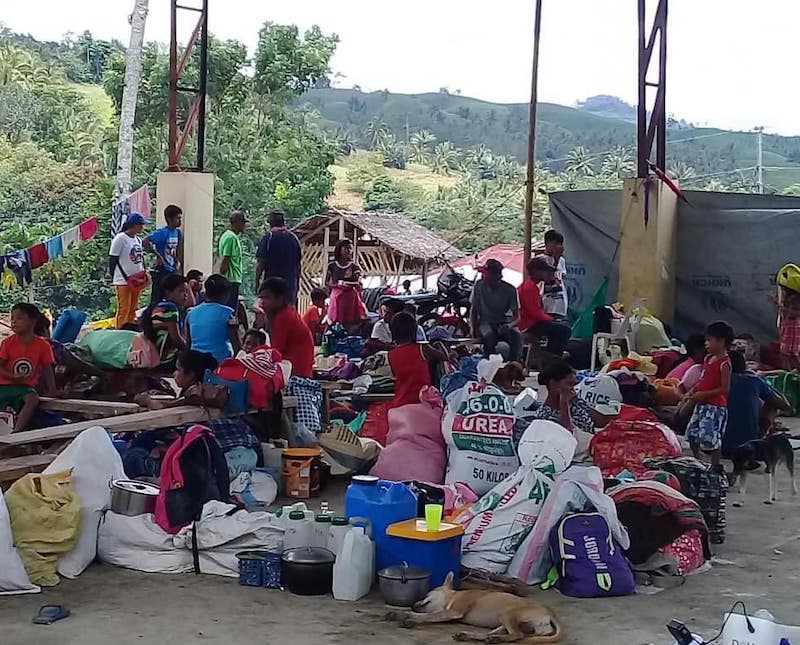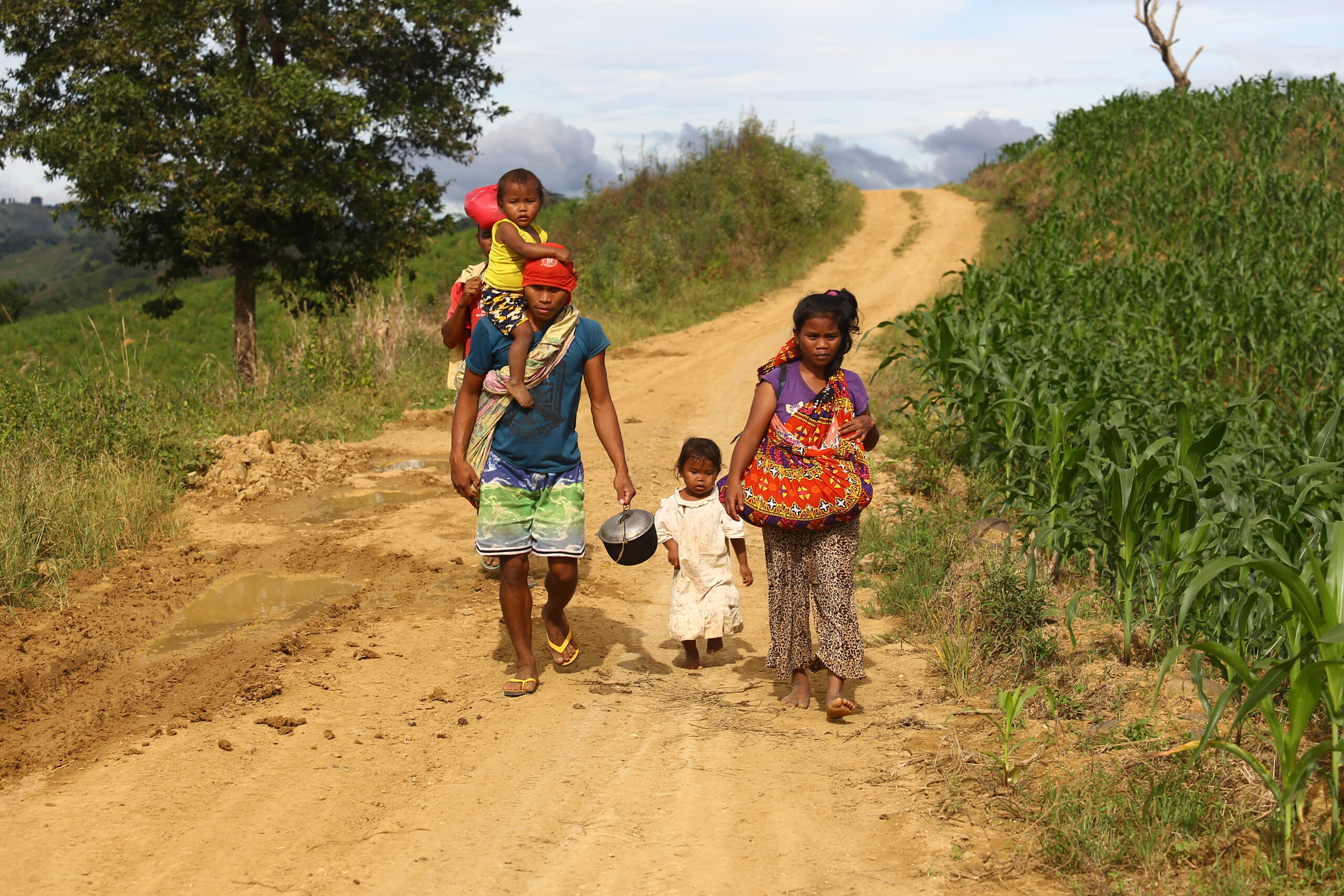KORONADAL CITY (MindaNews / 07 February) — The Bangsamoro Autonomous Region in Muslim Mindanao (BARMM) will conduct a review of land titles in a bid to settle the complex land conflict issue involving the ancestral domain of the non-Moro Indigenous Peoples in South Upi, Maguindanao, the region’s spokesperson said Saturday.
Lawyer Naguib Sinarimbo, also the Minister of the Interior and Local Government and head of the Bangsamoro humanitarian assistance arm, BARMM-READi, made the assurance in response to the call of the Non-Moro Indigenous Peoples Youth Network (NMIPYN), an umbrella of 10 non-Moro indigenous peoples (IPs) organizations in the BARMM, to review land titles issued in the disputed land.
“The issue in South Upi is very complex… It’s not just an issue of CADT (Certificate of Ancestral Domain Title) but of lands with Torrens titles,” he said in an online forum on “COVID, Conflicts and the Peace Process.”
A Torrens title is a certificate of land ownership issued by the Register of Deeds.
 Residents of 13 sitios in Barangay Kuya, South Upi, Maguindanao, seek shelter in a covered court to avoid getting caught in a crossfire between warring forces. Photo taken 31 May 2020, courtesy of FROILYN MENDOZA
Residents of 13 sitios in Barangay Kuya, South Upi, Maguindanao, seek shelter in a covered court to avoid getting caught in a crossfire between warring forces. Photo taken 31 May 2020, courtesy of FROILYN MENDOZA
Citing initial results of a fact-finding conducted by the Bangsamoro government, Sinarimbo said the root cause of the harassments that led to the displacement of thousands of families belonging to the Teduray and Lambangian tribes in South Upi is land conflict.
He said the priority of the Bangsamoro government is to first stabilize the peace and order situation in the affected villages in South Upi, as it would be difficult to settle the land disputes there if the security situation is volatile.
The land conflicts in South Upi recently came into the spotlight when armed men attacked Barangay Itaw last New Year’s Eve and burned 13 houses there. A few days later, the convoy of South Upi Mayor Reynalbert Insular, coming from the village for a humanitarian mission, was ambushed, killing a civilian and wounding three others.
A faction of the Islamic State-inspired Bangsamoro Islamic Freedom Fighters (BIFF), which splintered from the Moro Islamic Liberation Front (MILF) a decade ago claimed responsibility for the attack. (https://mindanews.com/top-stories/2021/01/biff-claims-responsibility-for-ambush-on-maguindanao-mayors-convoy/)
Sinarimbo said the BIFF members responded to calls from fellow Maguindanaons in South Upi who were allegedly being evicted from the area with the help of the members of the Citizen Armed Force Geographical Unit.
He confirmed that the MILF also has a presence in South Upi, and the communist New People’s Army, too, further complicating the situation in the area.
Sustainable solution
Edward Intang Abelardo, NMIPYN chair, said the displacement of members of the Tedurays and Lambangians in South Upi due to the intermittent harassments allegedly perpetrated by BIFF fighters to force the villagers to abandon their ancestral land, has lingered for nearly two years now.
He said the presence of MILF members in the area has also sown fear among the non-Moro IPs in South Upi, about an hour away from Cotabato City, the seat of the two-year old Bangsamoro government.
 A family from Barangay Itaw in South Upi, Maguindanao, flees to safer grounds on January 3, 2021, along with their neighbors, to avoid getting caught in a crossfire. (MindaNews photo by FERDINANDH B. CABRERA)
A family from Barangay Itaw in South Upi, Maguindanao, flees to safer grounds on January 3, 2021, along with their neighbors, to avoid getting caught in a crossfire. (MindaNews photo by FERDINANDH B. CABRERA)
Abelardo, during the forum suggested that the Bangsamoro government conduct a review of the land titles to settle the land conflict in the town.
“This needs a sustainable solution. It cannot be solved by giving rice, canned goods and noodles,” he said in Filipino, referring the displacement caused by the harassments.
Bong Fenis, of the Mindanao Peoples Peace Movement, said land conflicts have been blamed for a series of displacement even before the COVID-19 pandemic,
but the issue was amplified with the attack on Barangay Itaw on New Year’s Eve where over a dozen houses were burned.
Resodents in Barangays Kuya, Pandan and Pilar have also been uprooted in the last two years due to harassments by armed men, meant to force the villagers to abandon their communities, Fenis said.
Abelardo lamented that the Bangsamoro parliament has yet to pass the Indigenous Peoples Code, which is still pending at the Bangsamoro Parliament, to “ensure the rights and welfare of the minority non-Moro IPs are promoted and protected in the BARMM.”
Under the Bangsamoro law, the Bangsamoro Transition Authority, the 80-member MILF-led body tasked to govern the Bangsamoro during the three-year transition period, is mandated to pass a law that would “recognize, protect, promote, and preserve the rights of the indigenous peoples in the Bangsamoro Autonomous Region.”
The creation of the Bangsamoro region is the key component of the Comprehensive Agreement on the Bangsamoro (CAB), the final peace deal between the government and the MILF signed in 2014 after 17 years of negotiations.
Mandate to protect IPs
The Bangsamoro region was established in January 2019 following the ratification of Republic Act (RA) 11054 or the Organic Law for the BARMM, which ensures the protection of the rights and welfare of non-Moro IPs in the region.
Under Article IX, Section 3, the law directed the Bangsamoro government to recognize the rights of the indigenous peoples, including their rights to native titles or fusaka inged, indigenous customs and traditions and the free prior and informed consent.
It also mandated the creation of the Ministry for Indigenous Peoples , which shall have the primary responsibility to formulate and implement policies, plans and programs to promote the well-being of all indigenous peoples in the Bangsamoro Autonomous Region (BAR) in recognition of their ancestral domain as well as their rights thereto.
RA 11054 further states that the Bangsamoro law “shall not in any manner diminish the rights and benefits of the non-Moro indigenous peoples in the (region) under the Constitution, national laws, particularly Republic Act No. 8371, otherwise known as the “Indigenous Peoples’ Rights Act of 1997.”
Abelardo said that even the local government unit of South Upi “is at a loss” on the multiple claimants who obtained land titles under the Autonomous Region in Muslim Mindanao, which was abolished upon the ratification of the Bangsamoro Autonomous Region in Muslim Mindanao.
Sinarimbo noted the new Bangsamoro government, through the Ministry of Environment, Natural Resources and Energy, has not yet issued any land titles in the area since the region was established two years ago.
Minister Melanio Ulama of the Ministry of Indigenous Peoples Affairs in a video presented during the forum, said they want to fast-track the delineation of the ancestral domains of the IPs through Certificate of Ancestral Domain Title (CADT) and Certificate of Ancestral Land Title (CALT).
IPs, he said “are the most peace-loving people.”
Delineating their ancestral domain, he said, is a priority, “followed by livelihood projects.”
In the same video, Editha Sara, chair of Barangay Itaw, said facing a pandemic and an armed conflict at the same time is very difficult.
She appealed to the armed men to come to a dialogue and stop using their firearms to harass them.
She said they were about to harvest coconuts but had to flee. Who will then benefit if they leave their villages, she asked.
Organized by MindaNews in partnership with Internews, Saturday’s forum on “COVID, Conflicts and the Peace Process” focused on South Upi. Next Saturday, February 13, the focus is on Marawi.
“COVID, Conflicts and the Peace Process” is a two-session special edition of Reporting Mindanao, an online forum that MindaNews launched in October to discuss various concerns in Mindanao and to provide journalists a venue to enhance their coverage and understanding of these issues. (Bong Sarmiento / MindaNews)
Read also
SPECIAL REPORT: From RAG to ARMM to BARMM: the Indigenous Peoples’ Struggle for Ancestral Domains Continues
